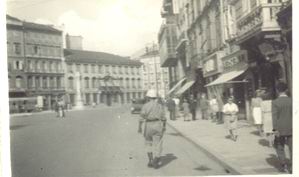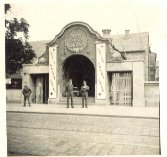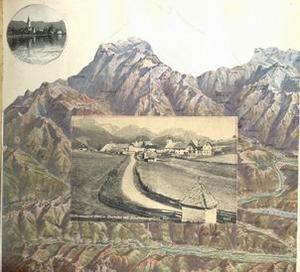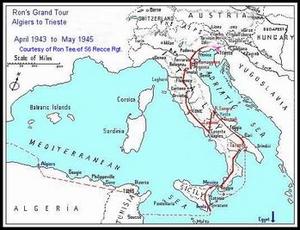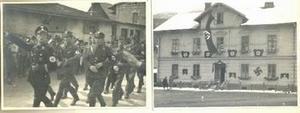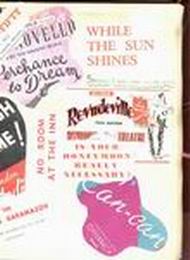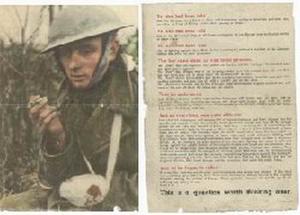
Photo shows: October 1945: On board a mine-sweeper in Trieste Harbour
From the Regimental Diary for 1 October 1945: 'Major JJ O’Brien left to go on a course in UK, also 14 days leave. Warning order received that the Regt will move to TRIESTE to become Recce Regt in 56th (Lon) Div in lieu of 44th Recce Rgt.'
October 1945
In October we moved to the Trieste area, to a small town called Opicina, which sat on the top of a hill overlooking the Bay of Trieste. The view from the peak was terrific. The area was known as the Morgan Line and acted as a buffer zone between the Yugoslavs and the Italians, both of whom laid claim to this territory.
The barracks we moved into had formerly belonged to an Italian army unit and were quite spacious. Almost overnight, stones were whitewashed, flagpoles were erected and 'bull' was the order of the day.
The system for release from the army at that time was based on a combination of age and length of service. This then gave one a 'group number', and over the next year or so each group number came up in turn and the members of that group received their discharge. The lower the group number the quicker you got out. My own group number was 48, rather high because I was only 19 when I was called up.
As the older and longer-serving members started to leave there was a frantic effort by those of us remaining to get into a reasonable position so that we would not be obliged to take part in the 'demilitarisation' that was taking place. Just by chance at that time, I was given a choice of two options. I could either go on a skiing holiday at Cortina, or take a course as a technical storeman. If I took the first option I might miss out on the chance for a 'safe' job - but on the other hand, when would another opportunity come up to learn to ski?
Being the coward that I am, I took the course, and as a result was promoted to Lance Corporal, then later to Full Corporal. Within a short time I was put in complete charge of all the technical stores in the squadron. The job required organising expertise rather than engineering experience, and I was soon well on top of the situation and enjoying my new-found responsibilities. At times, when I found myself signing for half a dozen tanks at a time, I used to say to myself: 'Hold on there...that's 180,000 pounds worth of equipment you've just become responsible for!' But I don't remember losing any sleep over the matter!
The regiment was very involved with the keeping of the peace in Trieste itself, as there were a lot of political parties and even numerous states trying to seize control of the Venezia Giulia area. It was quite common to be sitting in a cinema in town and to have a notice flashed on the screen that said: 'All troops must return immediately to their units.' On our arrival back in camp we would find ourselves being armed and sent back to the town in convoy to control the riots that were taking place.
While we were stationed here I got my first leave home back to England, briefly touched on in my story My Welcome Home.
Back in Trieste after my leave I found that the riots were still in full swing and that many more of the old-timers had left. With some of my friends, I also discovered the joys of gracious living. I hasten to explain.
The YMCA in Trieste had taken over a leisure centre which offered, amongst other facilities, a chance to have one's laundry done. On Friday evenings my friends and I would come into town and make straight for the YMCA. Here we would have a shower, a haircut, change our Khaki Drill uniform for a clean set left the week before, and then, all spick and span, we would head for one of the best restaurants in town.
We would go right through the menu, including wines with each course, followed by brandy and cigars. But the best part was yet to come. Instead of paying cash for these blessings we would each sell a tin of 50 cigarettes to the waiter and the cash received was more than sufficient to pay for the whole evening's entertainment, including the earlier visit to the YM! Strictly speaking, of course, the authorities would not have approved of our using army issue cigarettes for this purpose, but the result was that after our evening out we used to glow all the way back to camp.
January 1946
We settled down at Villa Opicina and Eddy Patman took over the job of running the canteen.
A word about Eddy. In civvy street he had been a film reviewer for the cinema trade magazine 'The Cinema'. He loved all aspects of the cinema and when we were in Rome I went with him to see 'The Song of Bernadette' and he sent a review of it back to his old firm and later showed me the article in the magazine. When he finally made it back to civilian life he achieved very high ranking both for MGM and later for Fox, and we were to stay firm friends right up to his untimely death in 1993.
February 1946
On one occasion the navy decided it would be a good idea if they were to send some of the matelots stationed in Trieste to our barracks for a day's leave. We showed them around, let them drive our tanks etc, and in short they had a good day's fun. In turn the navy invited some of us back to their own units and I was chosen to spend a day on a mine-sweeper in Trieste harbour.
It was a lovely day and all was going fine until it was pointed out to us that the degaussing equipment aboard (which neutralised the magnet mines in the harbour) had developed a fault. For the balance of the day the boat was surrounded by floating and very lethal German mines and we found ourselves fending them off and taking pot-shots at them!
March 1946
Among the cultural treats available in Trieste was an old Roman Castle named Castello San Giusto. In the summer months hey used to hold opera performances there, in the open, and I was lucky enough to see a performance of Carmen with an orchestra and cast of several hundred. The audience numbered 12,000 and the performance went on till the early hours of the morning.
April 1946
On 16 April my very good friend Leslie Gilbert and I attended a Passover service at the Marittima ballroom on the harbour front of Trieste. A fair amount of local civilians attended and the service was organised by an Austrian who had been released from a concentration camp and his two daughters, all of whom worked for AMGOT (Allied Military Government for Occupied Territories).
The service was about halfway through when there was a clamour at one of the doors. Some further concentration camp victims had arrived in the area and had heard of the service that was taking place. To our shame, the local Jewish Army Chaplain, who was present, wanted to keep them out, insisting that army rations had only been issued for those expected. Fortunately for good sense he was soon told in no uncertain terms that all those present would refuse to eat if the newcomers were not allowed in, and the evening proceeded without any further problems.
May 1946
Among the few civilians I knew in Trieste was the Austrian AMGOT worker I had met at the Passover service. I was at his house one evening and one of his daughters was just about to leave to visit another friend. Because the streets of Trieste were not altogether safe after dark, he asked me to escort her to her destination and I was happy to oblige.
We had just got into the street outside his flat when we literally stumbled over a body in the kerb. The young girl, I can’t remember her name, was very distressed but able to identify the dead person as another Jew who lived in a flat above her own. She asked me to telephone the police from a nearby bar, because she had no phone in her flat, and I escorted her back to the home we had just left. I phoned from the bar, not leaving my name or any information other than that there was a corpse in the street near the bar - because I had no intention of being involved with the Italian police when I was so near to going home on leave. A few days later I called to her home again to find out what had happened and was told that the police believed the dead man had committed suicide by jumping from the roof.
June 1946
On 8 June I was home on leave again, and this time it coincided with the official victory celebrations. I got myself good and early to a vantage point in Whitehall and had the pleasure of seeing a contingent of the 4th Hussars march past in the splendid parade, which included the carriage of King George VI and Queen Elizabeth. The photos in my album capture it all.
When I got back from leave it was to find that our barracks were being shared with the Royal Northumberland Fusiliers.
July 1946
Trieste was a very interesting place to be at this time and it was not unknown for a lot of black marketing to be going on between the troops and the civilians. Cigarettes in particular were in great demand by the civilian population. We as troops got a 'free issue' of 50 a week, plus we were able to buy at least a hundred a week in the NAAFI. These used to fetch a fair price on the streets and there was at least one 'scam' that some of our own MPs were said to have practised.
Apparently the MPs would watch out for British troops making a deal in a side alley, then pounce, confiscate all the cigarettes and any money being offered and let the offenders go on a promise not to offend again. Needless to say, once the guilty parties had fled the evidence was kept by the MPs for later sale to their own pet buyers.
August 1946
I had been overseas since April 1943 and it was therefore getting near the time for me to be sent home to England under the Python scheme. This was a system whereby, if one had served three years and nine months abroad, you qualified for home posting.
As my time got nearer I got more on edge and lived in fear of being involved in a situation that might postpone my home posting. One such possible event occurred because of my position as Tech Corporal in charge of Squadron Technical Stores. The stores themselves were in the barracks but immediately outside the store I kept various large items that were too big to be kept indoors. Among these items were two huge Staghound Armoured Car tyres. These, I hasten to say, were worth at least £100 to anyone who could supply them to the Yugoslav forces. One morning, immediately before roll call, the young lad who was my assistant and who I was training to take over from me came to me in a state of panic. The two tyres had been stolen.
I reported the matter to Busty Thomas and within minutes all the camp was sealed off. The short story is that the tyres were never recovered but all the evidence pointed to one Trooper X. The matter was never proven, however, and for about two weeks I sweated on being kept back in Italy as a potential court-martial witness. By a sheer coincidence, when I eventually returned to England the same Trooper X was on the same draft. For my own peace of mind I asked him to tell me, in all confidence, how he’d organised this massive theft, but he merely laughed and said, 'It wasn’t me mate !'
September 1946
From Opicina we now moved to the dockyard area of Monfalcone, just a few miles down the road but still in the Trieste Area. The barracks we took over were in a terrible state, particularly noticeable after having lived at Opicina for so long, and it says much for the morale of the squadron that we were able to transform it into something that was at least bearable.
For some time now my army rank had been Full Corporal, or Tech Corporal as I was known in the squadron. My responsibilities were twofold. In the first place I was responsible for seeing that all the stores necessary to run a squadron of Sherman tanks were kept up to date and I was the liaison between the mechanics and the Base Store Depots. My second responsibility was to keep the squadron leader, Major 'Loopy' Kennard, completely informed at all times as to the state of readiness of all the vehicles under his command.
Every morning I would set up the plan board in his office showing which, if any, vehicles were 'off the road'. This was vital information, as at the drop of a hat the squadron could be called onto the streets of Trieste to keep the peace. 'Loopy', or to give him his full title, Lieutenant Colonel Sir George Arnold Ford Kennard, 3rd Baronet, was quite a character then, and even now and his biography entitled simply 'Loopy' makes very good reading.
At the time in question he was sufficiently satisfied with my services to both him and the squadron to ask me to stay on in the army after I was due for demob. To induce me to stay he offered, as a bribe if you like, very rapid promotion, mentioning that it was quite common for a Quartermaster Sergeant to be made up to an officer in a very short time. I was not to be tempted, however, as the delights of London called and I was looking forward to life as a civilian. After the war I wrote to him and his delightful reply is at the back of my album.
October 1946
On 19 October the same year I struck lucky in what must have been a regimental ballot. The Regimental Association was about to hold its first post-war reunion, and as Winston Churchill was the honorary colonel the affair had to be done in style. Twenty men drawn from all ranks were sent home from Italy to be present on the night, and wonder of wonders, I was one of four corporals to travel a total of six days to attend the dinner.
We left Monfalcone on the Wednesday, got into London on Friday evening and turned up at the dinner on Saturday. By Monday we were on our way back, arriving back at camp on Wednesday evening. Of course I was able to fit some time in at home, and the dinner itself, held at the Connaught Rooms in Holborn, with Winston Churchill in attendance, was quite an experience.
From the Regimental Diaries: '8th Oct The Rgt was inspected by the Corps Commander Lt General Sir John Harding.'
The Regiment was visited by the Corps Commander, Lt General Sir John Harding, and the photo in my album brings it all back to me because I was in my office at the time. As I peeped out of the window to see what was going on I actually saw them take the photo. It’s particularly interesting to me today as it shows Busty, Loopy and Chesty Reed, the RSM.
December 1946
On New Year's Eve we were still at Monfalcone and a photo in the album shows seven of the lads, including myself, at the local fairground. We were at a rifle range that took your photograph if you hit the target and, much to our surprise, it actually worked!
January 1947
In January l947, just three months short of four years from the time I set sail to North Africa, I was posted home to Barnard Castle in Northumberland. I arrived just in time for the worst winter in some people's living memory and spent a large amount of time digging trains out of snowdrifts. For almost three months I then kicked my heels until in March I was finally released to return to civilian life.
February 1947
England was in a state of crisis as fuel was almost unobtainable. Rail travel ground to a halt. Heavy snowstorms and sub-zero temperatures made our barracks a place of purgatory and there was not a single toilet that worked in the barracks. We spent all day digging trains out of snowdrifts and as virtually everyone in the camp was on the point of being de-mobbed, rank meant nothing at all. For the first time in my army career I saw officers under the rank of captain being ordered to join snow-clearing parties and issued with spades to do some of the digging themselves!
March 1947
The last three months of my army life was boring to say the least, and I welcomed any chance to do something different. This probably accounted for the fact that I must have volunteered for the job of prisoner’s escort, of which details now follow.
While I was fighting in Italy, somebody who shall be nameless had apparently been a naughty boy back in England and had been sentenced to a term in Lincoln jail. He’d just finished his sentence (two years) and I as 'Corporal in charge of Escort' plus one other trooper were to meet up with him at the prison and escort him back to the army at Darlington.
The ex-prisoner lived in London and as we had to change stations at King's Cross I agreed to let him visit his folks in Caledonian Road before we finally took him back to camp. Mindful of the fact that if I lost a prisoner it was a court martial offence I took no chances and we kept him on handcuffs all the way to his house and afterwards all the way back to barracks.
Demobilisation
The long-awaited day eventually arrived. From Barnard Castle I travelled by train to York, where my official demob took place. The large hall where I made my goodbyes was packed with hundreds of men trying on the latest that Montague Burton had to offer, although if I remember rightly you could have any colour suit providing it was navy or brown and any style providing it was single breasted or double breasted! I had been in the army for four and a half years, and as dad, G-d rest his soul, would have said, 'It's enough already'. It was time to go home.
Three months after I was demobbed I received a payment from the War Office of six shillings and four pence. This was accompanied by a pay form that explained that the money in question was two days' ration allowance for escorting a prisoner back to Darlington from a jail in Lincoln!
And so I come to the end of this unlikely saga. I had packed a lot into the years between 1923 and 1947, and at the age of 24 was ready to start my life all over again.



